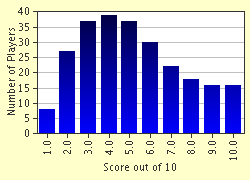Quiz Answer Key and Fun Facts
1. If an American, who has just relocated to Japan, is told that s/he is going to live in a "manshon," what type of dwelling can s/he expect to be moving into?
2. All of the following words or phrases, except for one, have the same approximate meaning: to tell someone to be quiet. Which is the odd one out?
3. What is the name of the indigenous people of Japan?
4. In "Memoirs of a Geisha" -- a novel by Arthur Golden which vividly recounts the life of a renowned early 1900s geisha -- what is the main character's name?
5. Let's imagine that a man, who wears a size 10 shoe in the US, needs to buy shoes in Japan. What size would he need to look for?
6. What is the Japanese word for bread?
7. The English name for the legislative branch of the People's Republic of China is the "National People's Congress," while in Great Britain, for instance, it is called the "Parliament of the United Kingdom". What is the English name for Japan's legislative branch?
8. The Japanese language has many compound words with interesting literal translations. For example, what is the literal translation of "mendokusai", which means "troublesome"?
9. Japanese citizens cannot legally smoke, drink alcohol, drive a car, or vote until they reach the age of 20. True or false?
10. Which place in the world has the largest Japanese population outside of Japan?
Source: Author
vadiamond
This quiz was reviewed by FunTrivia editor
Beatka before going online.
Any errors found in FunTrivia content are routinely corrected through our feedback system.


